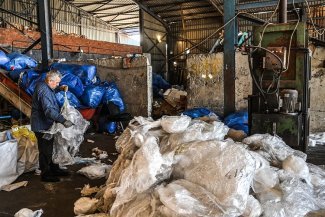It was the Russian novelist and humanist Fyodor Dostoyevsky, author of Crime and Punishment, who wrote: “The degree of civilization in a society can be judged by entering its prisons.”
Prisons in England and Wales have some way to go before they rival the horrors of the tsarist and Stalinist gulags.
But the system – beset with the chronic under-staffing of prison officers, spiralling violence, drug abuse, over-crowding, self-harming, suicides and high-profile prisoner escapes, amongst a host of problems – is facing what could be termed an existential crisis.
“The prison system in England and Wales is in meltdown,” Steve Gillan, general secretary of the Professional Trades Union for Prison, Correctional and Secure Psychiatric Workers, also known as the Prison Officers’ Association (or POA), told Equal Times.
“Our members are facing serious health and security issues. Assaults on prison staff are now averaging 16 a day, a 38 per cent increase on last year. Prisoner-on-prisoner violence has increased, the number of prisoners committing suicide has increased. Drugs, the use of mobile phones and other illegal activities are all spiralling out of control.”
Chronic understaffing and budget cuts lie at the heart of the prison crisis, argued Gillan.
“The prisons budget has been cut by £900 million [approximately US$1.134 billion] since 2010. In 1990 we had 40,000 prisoners in England and Wales and 23,000 prison staff. Today we’ve got 86,000 prisoners and 13,000 staff. It just doesn’t add up, does it?”
Last month on 15 November an estimated 8,000 prison officers came out in a day of protest following the breakdown of negotiations between their trade union, the POA, and their employer, the Ministry of Justice, which is responsible for running the 123 prisons in England and Wales. Jails in Scotland and Northern Ireland are run by their respective devolved governments.
Under the 1994 Criminal Justice and Public Order Act strikes by key public sector workers – such as prison officers, police and nurses – are deemed illegal.
Although the POA stressed that their action was a “day of protest” and not a “strike”, they were ordered to return to work following a high court injunction brought by the Ministry of Justice, who argued the protest was “an unlawful industrial action”.
“The injunction prevents the POA and any of its officials from inducing, authorising or supporting any form of industrial action by any prison officer which would disrupt the normal running of the prison service in England and Wales,” the Ministry of Justice said in a statement.
Whatever the dialectics of the ongoing dispute, the POA action has forced the government back to the negotiating table.
“Negotiations between us and the Ministry of Justice over staffing levels and other issues are ongoing. We are hoping for an updated offer soon which we can then put to our executive and members,” said Gillan.
And regarding possible future industrial action, he warned: “At this moment we have not ruled anything out or anything in.”
Drugs and suicides
Meanwhile, a wave of synthetic cannabinoid drugs, sometimes smuggled in via drones, is flooding prisons.
Known as ‘Spice’, ‘Black Mamba’ and ‘K2’ – and often described as more powerful and debilitating than traditional hard drugs such as heroin and cocaine – the chemical weed has been blamed for the spike in penitentiary violence and self-harming.
“Drugs, especially so-called Spice and Black Mamba are a real issue,” said Gillan. “If we had the correct staffing levels there wouldn’t be the same amount of drugs in jails. We simply don’t have enough prison officers.”
And on 28 November the prison system in England and Wales was hit with another shattering blow.
According to a report by the highly-respected Howard League for Penal Reform, 102 people have committed suicide in prisons in England and Wales so far this year – an all-time record.
“The rise in the number of prison suicides has coincided with cuts to staffing and budgets and a rise in the number of people in prison, resulting in overcrowding. Violence has increased and safety has deteriorated,” said the report, entitled Preventing Prison Suicide.
“The prison suicide rate, at 120 deaths per 100,000 people, is about 10 times higher than the rate in the general population.
“Investing in staffing must go hand in hand with a reduction in the prison population if prisons are to be made safer,” the report said.
Frances Crook, the Howard League’s chief executive, stated: “The number of people dying by suicide in prison has reached epidemic proportions. No one should be so desperate while in the care of the state that they take their own life. And yet every three days a family is told that a loved one has died behind bars.”
And Deborah Coles, Director of independent charity Inquest, which provides free advice to people bereaved by a death in custody and detention, told Equal Times: “This appalling death toll reflects the desperate reality of our overcrowded, dehumanising and violent prison system and the failure to protect those in its care.
“The only way to stop the morally indefensible tide of prison deaths and violence, to protect the health and safety of prisoners and staff in British jails, is to dramatically reduce the prison population, invest in alternatives and transform the culture of prisons so that they become places of last resort and true rehabilitation.”
In response to the suicides report, a spokesperson for the Ministry of Justice informed Equal Times: “Mental Health in custody is taken extremely seriously and there are a range of measures already in place to help support prisoners.
“But we recognise that more can be done. That is why we have invested in specialist mental health training for prison officers, allocated more funding for prison safety and have launched a suicide and self-harm reduction project to address the increase in self-inflicted deaths and self-harm in our prisons.”
“A toxic mix”
With just over 95,000 inmates (95 per cent of them men), England, Wales, Scotland and Northern Ireland have the largest prison population in western Europe – housing almost 20,000 more prisoners than France and 30,000 more than Germany, according to the Strasbourg-based Council of Europe the continent’s leading human rights organisation.
This predilection for incarceration is highlighted by the number of prisoners per 100,000 head of population, numbering almost 150 in Britain – compared with 118 for France and just over 81 in Germany.
“Cutting staff and prison budgets while allowing the number of people behind bars to grow unchecked has created a toxic mix of violence, death and human misery,” said Crook.
Facing a barrage of criticism, on 3 November this year the Ministry of Justice published a new White Paper, outlining an ambitious prison safety and reform programme.
Promising to “overhaul the entire prison system” the White Paper concedes: “Our prison system needs reform. It fails to rehabilitate or make sure criminals are prevented from offending again. Currently, nearly half of adult prisoners are reconvicted within one year of release. We will take immediate action to address threats to prison security and change the culture of our prisons.”
The government programme promises to spend £1.3 billion (approximately US$1.64 billion) on closing ageing inner-city prisons and replacing them with 11 new prisons for 10,000 extra prisoners by 2020.
Prison governors are to be given more powers over their budgets to spend on education, work and health. No-fly zones for drones will be imposed around jails. Drug testing on entry and exit from penal institutions is to be made mandatory.
And crucially, from the perspective of the POA, there is a promise to spend an additional £104 million (US$131 million) to recruit an additional 2,500 prison officers.
“This will be the most far-reaching reform of our prisons in a generation and a key part of the government’s social reform programme – creating a society that works for everyone,” said Justice Minister Elizabeth Truss.
It’s a dream of redemption worthy of the great Dostoyevsky himself.









